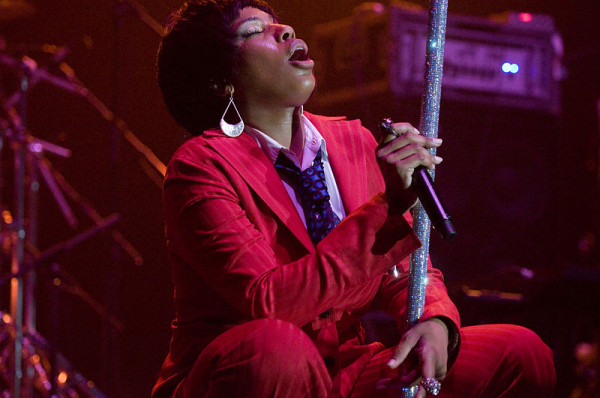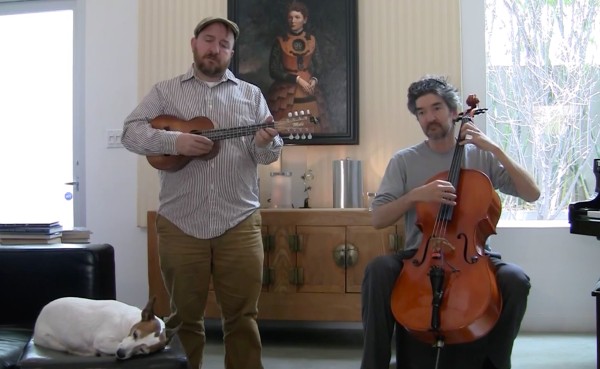Much has been written lately about women’s speech patterns, and whether certain verbal behaviors like uptalk (a.k.a. valleyspeak), vocal fry (a.k.a. creak), and “sexy baby voice” are hurting their careers and preventing people from taking them seriously. According to Lake Bell, a woman who talks this way sounds like “a 12-year-old little girl that is submissive to the male species.” Much has also been written about how this policing of women’s speech patterns is totally, like, sexist. As Debbie Cameron, author of The Myth of Mars and Venus, writes on her blog Language: A Feminist Guide:
This week everyone’s been talking about an article in the Economist explaining how men’s use of language undermines their authority. According to the author, a senior manager at Microsoft, men have a bad habit of punctuating everything they say with sentence adverbs like ‘actually’, ‘obviously’, ‘seriously’ and ‘frankly’. This verbal tic makes them sound like pompous bullshitters, so that people switch off and stop listening to what they’re saying. If they want to be successful, this is something men need to address.
OK, people haven’t been talking about that article—mainly because I made it up. No one writes articles telling men how they’re damaging their career prospects by using the wrong words. With women, on the other hand, it’s a regular occurrence.
We admit, we’re guilty of this policing ourselves. We have whiled away many an hour complaining about the vocal fry on certain podcasts and radio shows. We have rolled our eyes at young women who say their name on their voicemail like it’s a question mark. We always assumed that these verbal tics — turning every declarative, even one’s own name, into a question; frying at the end of every sentence; using more words when fewer would do; etc. — made women sound insecure, hesitant, and submissive. Or, at the very least, these tics served as a distraction from the content of what they were saying. And as the mothers of daughters — we each have a seven-year-old girl — we certainly don’t want them to be seen this way by the world. Who would, right? We consider it our responsibility, as feminists, to raise daughters who speak with confidence and authority.
And yet. This roundtable on women’s speech, hosted by Terry Gross on her show Fresh Air, made us realize that maybe the problem isn’t the way young women speak. Maybe the problem instead is the fact that people automatically associate qualities like submission and insecurity with stereotypically female speech patterns. And maybe if young women try to change the way they talk, people won’t have a reason to change their shitty sexist attitudes about women. If you change your behavior to fit in, you won’t change the way people think. As Stanford linguistics professor Penny Eckert told Terry Gross:
You only get change by not allowing it to be a problem to you. And I think this is something that has been huge in all of the years that people have been studying minority dialects. African-American vernacular English is a very rich dialect, and yet little kids are told they better not speak that if they want to succeed in the world. So the question is, do you knuckle under to that or do you try to make the world change a little bit? And certainly, that’s how I feel about a lot of the women’s styles is that if we all cower under and say do what I did in 1973 [consciously speak lower to be taken seriously], well then, what’s going to change?
Oh, and another thing: Most young people don’t have a problem with the way young women speak. They don’t think that vocal fry makes someone sound submissive — in fact, one study found that women in sororities use creaky voice to establish dominance and to get new recruits to do as they’re told. Eckert continues:
I was shocked the first time I heard this style on NPR. I thought, “Oh my god, how can this person be talking like this on the radio?” Then I played it for my students, and I said, “How does she sound?” and they said, “Good, authoritative.” And that was when I knew that I had a problem. … That I was not a part of the generation that understood what that style means. … There’s been a change and those of us who are bothered by some of these features are probably just getting old.
According to journalist Jessica Grose, former host of Slate’s podcast the DoubleX Gabfest and another Fresh Air guest, most of her vocal fry was actually the result of her attempting to control her upspeak. She once sought help from a from a voice coach in an effort to make herself sound more professional, after receiving so many complaints about her valley girl voice on the podcast. But focusing so much on what was wrong with her voice felt suffocating, Grose told Terry Gross:
I felt like it was blunting my emotional range. I felt when I was self-conscious about my voice it lost that expressive, connective quality … There was something lost when I wasn’t being myself, whatever that is.
And it’s not just the way women speak that is policed — it’s what they say, and how much they say, too. Women who want to “get ahead” in their careers, or simply to be taken more seriously in general, are often told that it’s girly to say something like, “Would you like to go to lunch?” and that it’s infinitely more manly — and, the assumption goes, more powerful and respectable — to say, “Let’s go to lunch.” Use fewer words, women are told. Don’t be so cooperative and communicative. Except people don’t actually say, “Don’t be so cooperative and communicative.” Instead they say, “Don’t be so compliant and chatty.” You see what happened there? Worthy qualities are turned into something submissive and girly, just because women are more likely to exhibit these qualities than men.
Because, yes, women do, on average, have different communication styles from men. Whether this is nature or nurture, the debate rages on — a little bit of nature but largely nurture, we think — but it begins as early as elementary school, and perhaps even earlier. Studies have shown that female friendships in elementary school are based more on equality and cooperation, with the girls valuing trust and communication over hierarchy or dominance. Meanwhile, boys tend to socialize in bigger groups with strict hierarchies of dominance — in fact, boys may actually interrupt a certain activity if they fear it may affect their place in the hierarchy.
Sure, it would be nice if our culture treated boys and girls with equality, so that perhaps school children wouldn’t feel so pigeon-holed to act a certain way with their same-sex friends. But wouldn’t it also be nice if we gave equal respect to the way girls and boys, and men and women, communicate?
That all said, we might not be sexist, but we’re still old. We’re in our forties, and this sort of change in attitude doesn’t come naturally. It’s really hard not to cringe when a woman use valleyspeak in a business meeting! It’s one thing to wave a banner for equal pay, but to join a march for vocal fry and uptalk? That’s a cause that’s a little harder to get behind. But we can, at the very least, stop marching for the other side. We can, at the very least, stop telling women that they sound girly when they talk the way they talk.




















